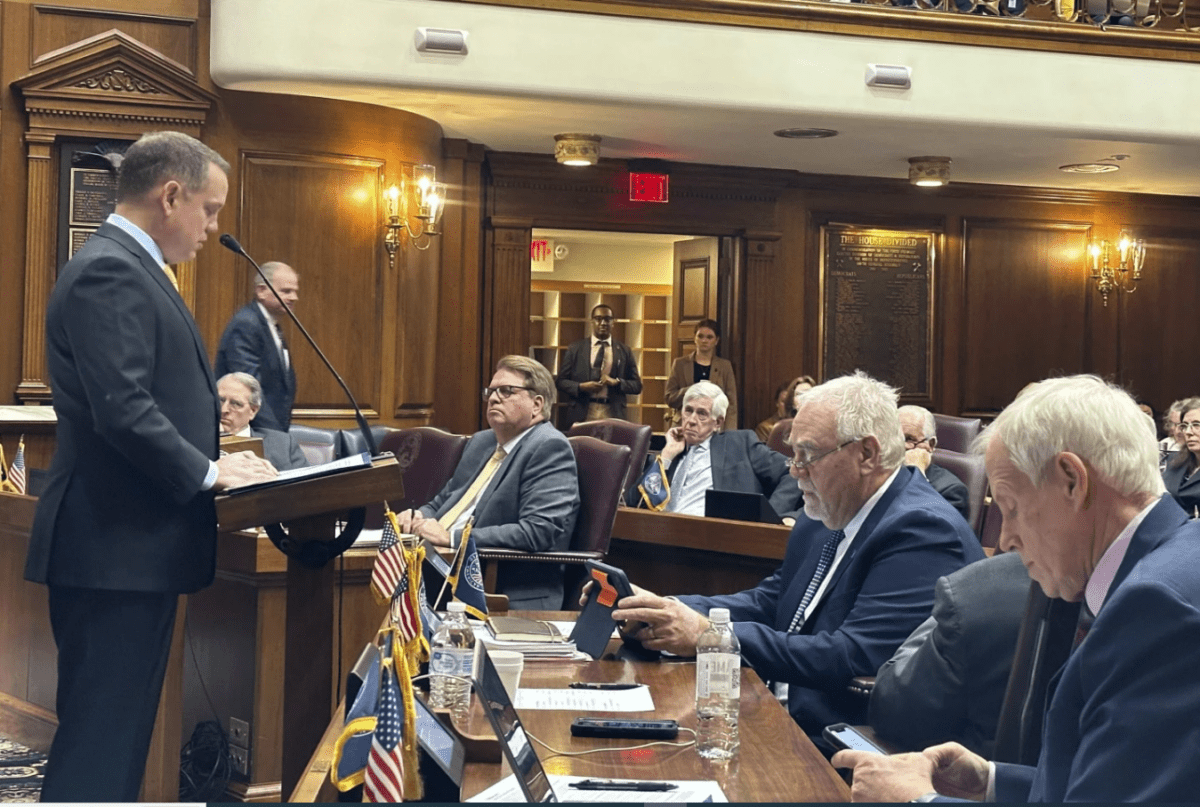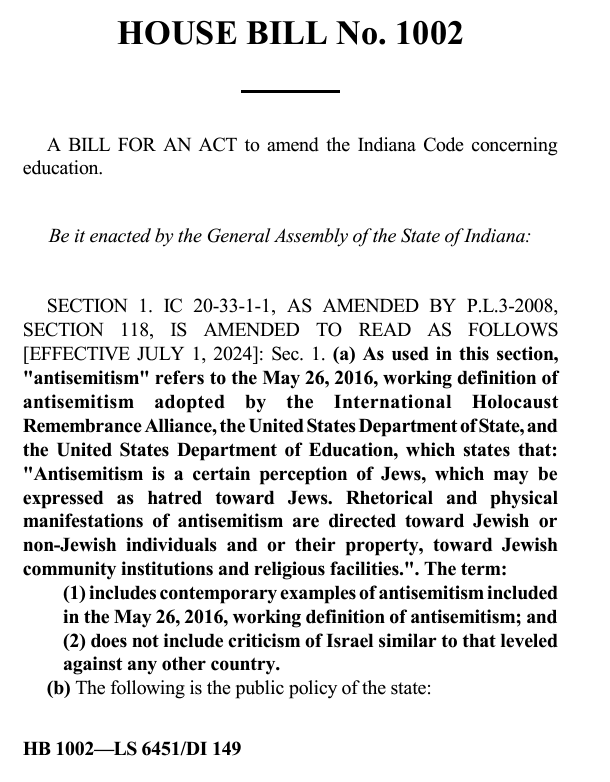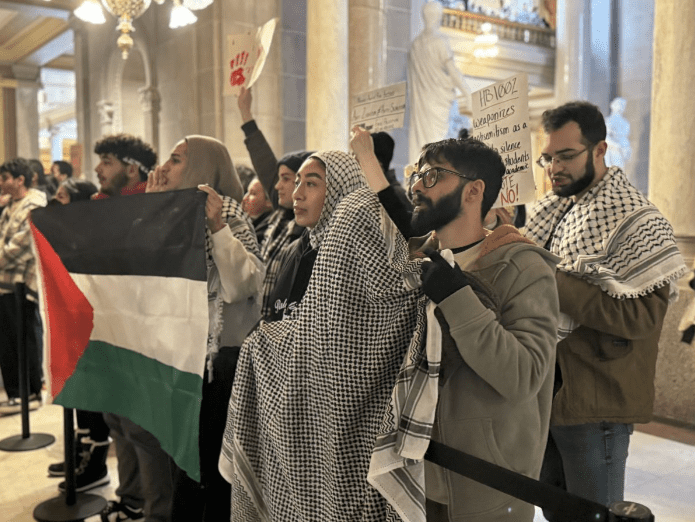The Indiana House of Representatives unanimously approved HB 1002, which defines antisemitism as religious discrimination in the state education code, Jan. 18.
With current conflicts in the Middle East, the bill that failed in previous sessions found support amongst advocates who say instances of antisemitism have increased on Indiana college campuses since the Oct. 7 Hamas attack on Israel.
During this attack, militants stormed into Israel from Gaza, killing over 1,200 people who were mostly civilians. They also captured around 250 people.
RELATED: 2024 Indiana legislative bills that affect minorities
“We must define antisemitism if we are to counter antisemitism. This legislation provides a universal definition that will align Indiana with a widely accepted standard,” said Jacob Markey, executive director of Indianapolis Jewish Community Relations Council (JCRC), in a statement to the Indianapolis Recorder.
“Sadly, in 21st century America and in our own state, Jewish students are being targeted and are afraid to be who they are. It is unconscionable and antithetical to our deeply held Hoosier values.”
The Indianapolis JCRC commended the unanimous approval, with other Jewish organizations happy to see progress with the bill.

What is defined as antisemitism?
“The problem now is that the forces that hate Jews, they’re trying to cover up their hatred by presenting it as anti-Israel hatred. Now, of course not everybody that hates Israel is antisemitic, but many, if not most, of these people are,” said Allon Friedman with the Jewish American Affairs Committee of Indiana.
“This can be demonstrated on campuses with these protests against Israel. They’re harassing and abusing Jewish students and organizations. The bill is simply to clarify what antisemitism is. That’s all it is.”
The bill states that “antisemitism” refers to the May 26, 2016, working definition of antisemitism adopted by the International Holocaust Remembrance Alliance, the United States Department of State, and the United States Department of Education.

From the International Holocaust Remembrance Alliance:
- Calling for, aiding, or justifying the killing or harming of Jews in the name of a radical ideology or an extremist view of religion.
- Making mendacious, dehumanizing, demonizing, or stereotypical allegations about Jews as such or the power of Jews as collective — such as, especially but not exclusively, the myth about a world Jewish conspiracy or of Jews controlling the media, economy, government or other societal institutions.
- Accusing Jews as a people of being responsible for real or imagined wrongdoing committed by a single Jewish person or group, or even for acts committed by non-Jews.
- Denying the fact, scope, mechanisms (e.g. gas chambers) or intentionality of the genocide of the Jewish people at the hands of National Socialist Germany and its supporters and accomplices during World War II (the Holocaust).
- Accusing the Jews as a people, or Israel as a state, of inventing or exaggerating the Holocaust.
- Accusing Jewish citizens of being more loyal to Israel, or to the alleged priorities of Jews worldwide, than to the interests of their own nations.
- Denying the Jewish people their right to self-determination, e.g., by claiming that the existence of a State of Israel is a racist endeavor.
- Applying double standards by requiring of it a behavior not expected or demanded of any other democratic nation.
- Using the symbols and images associated with classic antisemitism (e.g., claims of Jews killing Jesus or blood libel) to characterize Israel or Israelis.
- Drawing comparisons of contemporary Israeli policy to that of the Nazis.
- Holding Jews collectively responsible for actions of the state of Israel.
There are 7 out of the 11 examples that directly talk about Israel and its policies that labels this type of language as antisemitic. This is where free speech concerns come in for people opposing the bill.
Indiana students speak out against the HB 1002
Over two dozen people gathered outside of the House Chamber Jan. 18 to protest HB 1002.
However, the bill also includes contemporary examples of antisemitism included in the May 26, 2016, working definition. This does not include criticism of Israel similar to that leveled against any other country.
John Willems, a senior social work major at IUPUI, was among the protesters who testified against the bill on Jan. 10 before it headed to the House floor.
He has been involved in different student led clubs and organizations. Willems has also attended many protests and rallies in support of Palestinians.
“I’m not Jewish myself, and I’m not Palestinian, but I am a student with peers that are both on campus. I share an interest in learning about both of those cultures and both of their history of resistances and struggles,” said Willems.
He said that Middle Eastern students have experienced Islamophobia and Palestinian students have been harassed. As a student leader, he and his peers have tried to make these incidents known to administrators.
addressing antisemitism or silencing free speech?
Now, he wants these incidents to be known to lawmakers.
“I wanted to be able to go there and express how I felt, that this legislation would not be enough to actually combat discrimination on campus, but it adds to an already repressive environment on campus,” said Willems.
“The bill claims that it is including this definition of what antisemitism means. The issue is that it conflates antisemitism with any criticism of the State of Israel.”
Willems said on IUPUI’s campus there have been many events acknowledging Palestine as a culture and indigenous people.
“Those events are being cancelled and shut down already. What I would hope from actual antidiscrimination legislation would be to not remove or separate antisemitism from other forms of oppression,” said Willems.

Jewish organization against HB 1002
Malkah Bird with Jewish Voice for Peace – Indiana said that she is concerned about HB 1002 passing, noting that members of the Indiana Black Legislative Caucus chose not to vote on it.
Jewish Voice for Peace – Indiana strongly oppose the bill.
“We are an organization who’s been working to fight antisemitism for a very long time. For us, it’s really important that we’re not conflating criticism of Israel with antisemitism,” said Bird.
“$3.8 billion of our tax dollars go to Israel every year in military aid. This bill that claims to fight antisemitism in fact is just a vehicle to stifle criticism of Israel. This makes it harder for our communities to come together.”
Fair Indiana legislation for all
Maliha Zafar, executive director of the Indiana Muslim Advocacy Network, said that organization stands firm against any form of antisemitism. They do not believe in any form of hate. They are however speaking out against the bill because it will label certain acceptable forms of speech as antisemitic.
“This raises concerns because this will largely affect people who are advocating for Palestine right now. We had a lot of students from IUPUI and IU Bloomington testify against the bill and give their testimony on Islamophobia on campus,” said Zafar.
“It was really disappointing to see the outcome of it passing out of committee. We would love to work alongside the Jewish community to come up with legislation that protects everyone and protects our freedom of speech.”
Elliot Bartky, emeritus professor of political science at Purdue University, Fort Wayne, said that students and organizations like the Muslim Advocacy Network have a wrong understanding of the bill.
Addressing antisemitism or silencing free speech?
“What happened in American society and in American politics and culture? I used to get beat up as a kid growing up in New Jersey being Jewish. I’ve been beaten up many times, and it’s nothing compared to what’s going on,” said Bartky.
“I was at an Israel rally in Chicago, Oct. 15. Obviously, I’m Jewish, I have a long white beard and black suit, and here comes a car slamming on the breaks close to me screaming out, ‘Death to the Jews!’”
Bartky said he was very disappointed in the Indiana Black Legislative Caucus not being in attendance for the bill.
“Even if we do pass the bill, and I sure hope it does pass, we’re confident that it’s going to pass, you have crazies on the right and crazies on the left,” said Bartky.
“This is a very historic moment and for the Black Caucus to walk out like that is historic for me. It’s a betrayal of the civil rights movement.”
The Indiana Black Legislative Caucus did not release a statement on why their members did not vote on the bill.
Islamophobia vs antisemitism stats since Oct. 7, 2023
Islamophobia and antisemitism are seeing sharp increases across the US after the war in Israel and Gaza started.
According to a report by the Council on American-Islamic Relations (CAIR), the Muslim civil rights and advocacy organization received a total of 1,283 reports of bias between Oct. 7 and Nov. 4, 2023.
This is a 216 percent increase from the previous year.
The top reported type of case was free speech issues.
The organization also said reports involved targeting employment, consisted of hate crimes and anti-Arab and Islamophobia education and bullying.
On Oct. 25, 2023, the Anti-Defamation League recorded a total of 312 antisemitic incidents, 190 of which were directly linked to the violence Israel has afflicted on Gaza, from Oct. 7 to Oct. 23, 2023.
This is a nearly 400 percent increase in antisemitic incidents reported year over year.
The Palestinian death toll in Israel’s attack on Gaza has surpassed 25,000. This includes at least 9,600 children.
HB 1002 passed through the Indiana House on a vote of 83-0. It now moves to the Indiana Senate.
Contact staff writer Jade Jackson at (317) 762-7853 or by email JadeJ@IndyRecorder.com. Follow her on Twitter @IAMJADEJACKSON.




